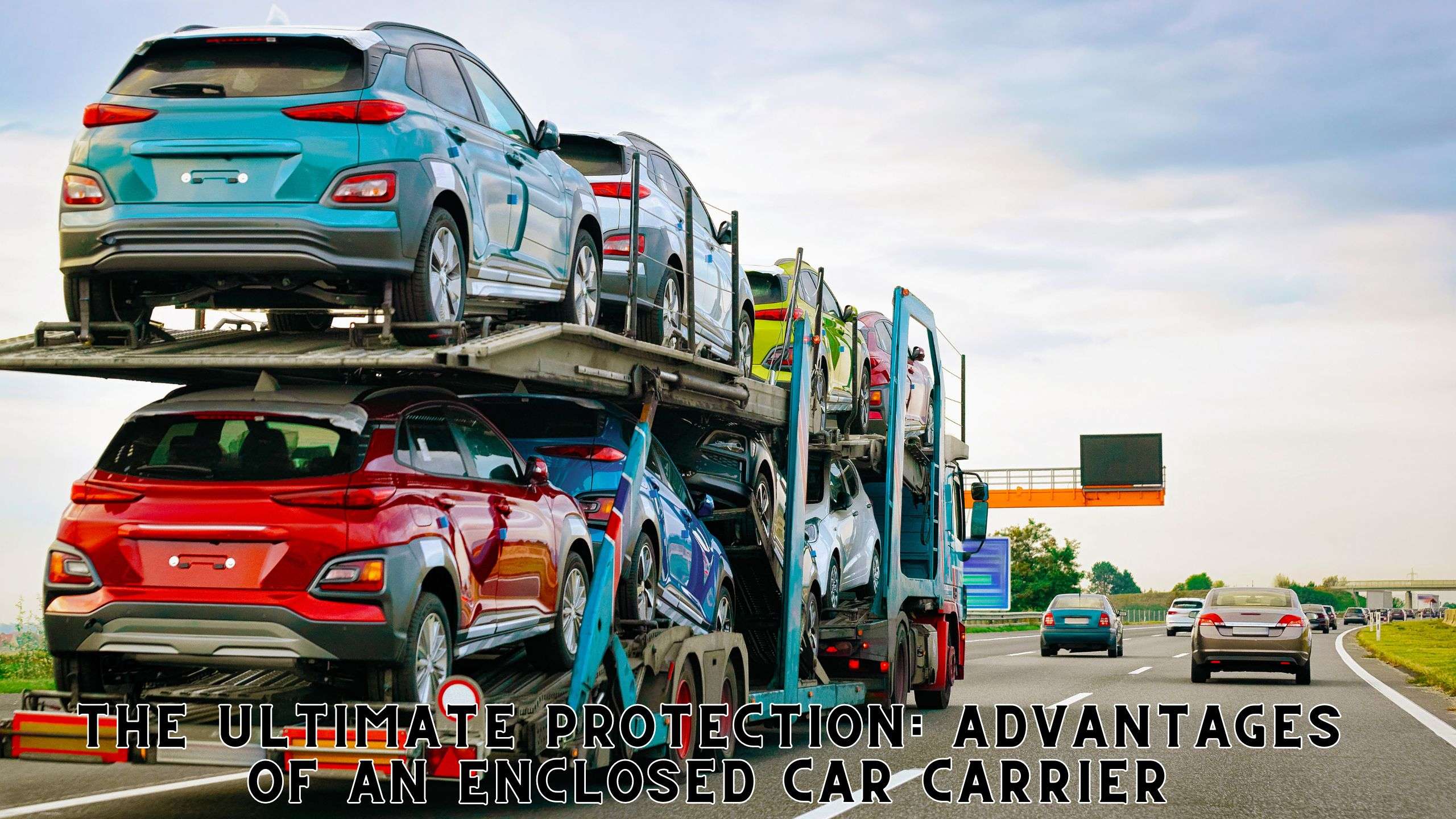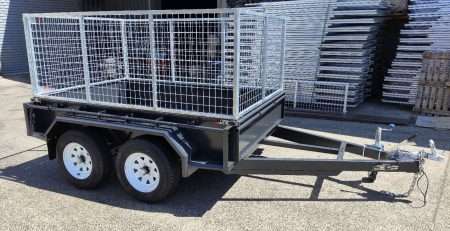
The Ultimate Protection: Advantages of an Enclosed Car Carrier
The Benefits of Enclosed Car Carriers
When it comes to transporting vehicles, an enclosed car carrier offers several advantages over open transport options. Whether you own a high-value vehicle, want enhanced security and privacy, or seek protection from weather and road debris, enclosed car carriers provide the ultimate protection for your precious automobile.
Protection for High-Value Vehicles
The protection that enclosed car carriers offer is priceless for owners of high-value vehicles, such as luxury cars, classic cars, or exotic sports cars. These carriers ensure that your vehicle is shielded from potential damage during transit, offering peace of mind knowing that your prized possession is in safe hands. With an enclosed carrier, your vehicle is protected from outside elements such as weather conditions, road debris, and potential damage from other vehicles (Tempus Logix).
Enhanced security and privacy
Enclosed car carriers provide an extra layer of security and privacy for your vehicle. With the enclosed design, your car is not exposed to the prying eyes of passersby or potential burglars. The closed structure of the carrier ensures that your vehicle remains hidden from view, reducing the risk of theft or vandalism. This added security helps to maintain the privacy of your vehicle during transportation, giving you peace of mind throughout the process (source).
Shielding from weather and road debris
One of the key advantages of enclosed car carriers is their ability to shield your vehicle from various external elements. Whether it’s rain, snow, hail, or dust, your car remains protected within the enclosed carrier. The closed structure ensures that your vehicle is not exposed to potentially damaging weather conditions, minimising the risk of paint damage, corrosion, or other weather-related issues. Furthermore, an enclosed carrier provides a barrier against road debris, such as rocks and debris kicked up by other vehicles, reducing the chances of dents or scratches during transit.
By choosing an enclosed car carrier, you can enjoy the utmost protection for your high-value vehicle, enhanced security and privacy, and peace of mind knowing that your car is shielded from weather conditions and road debris. While enclosed transport may come at a higher cost compared to open transport options, the benefits it offers make it a worthwhile investment for those seeking top-tier protection for their valuable automobiles.
Factors to Consider for Enclosed Car Carriers
When deciding whether to opt for an enclosed car carrier for your vehicle transportation needs, there are several important factors to consider. These include the cost comparison with open transport, the suitability for speciality vehicles, and the limited capacity and potential waiting times.
Cost Comparison with Open Transport
It’s essential to weigh the cost implications when considering enclosed car carriers. Enclosed car shipping is approximately 40% more expensive than open transport, with an average cost of around $1,500. The additional cost is due to the added protection and security offered by enclosed carriers. However, it’s important to note that the majority of customers opt for open transport due to its lower cost and widespread availability.
Suitability for Speciality Vehicles
Enclosed car carriers are particularly well-suited for speciality vehicles or cars with low ground clearance. These vehicles often require extra care during transportation to avoid potential damage. The enclosed environment of these carriers provides protection from external elements, such as debris and weather conditions, ensuring the safe arrival of your valuable vehicle at its destination.
Limited capacity and potential waiting times
It’s important to consider the limited capacity of enclosed car carriers compared to open car carriers. Enclosed carriers typically have a lower capacity, which means they may be less suitable for transporting multiple vehicles at once. If you require the simultaneous transport of multiple vehicles, an open carrier might be a more practical choice.
It’s also worth noting that, due to the relatively lower demand for enclosed car carriers, there may be potential waiting times involved. The limited availability of enclosed carriers can result in longer lead times for scheduling the transportation of your vehicle. If you have a specific timeframe in mind, it’s important to take this into consideration when deciding on the type of car carrier to use.
By considering the cost comparison, the suitability for speciality vehicles, and the limited capacity and potential waiting times, you can make an informed decision about whether an enclosed car carrier is the right choice for your vehicle transportation needs. Remember to research reputable car shipping companies, compare their services, and ensure the safety and security of your vehicle during transportation.
Features and Services of Enclosed Car Carriers
When it comes to transporting vehicles, enclosed car carriers offer a range of features and services that provide added protection and peace of mind. These specialised carriers go beyond the standard open transport options and cater to the needs of high-value, classic, and luxury vehicles. Let’s explore some of the key features and services offered by enclosed car carriers.
Advanced Security Measures
Enclosed car carriers prioritise the safety and security of the vehicles being transported. They are equipped with advanced security measures such as satellite tracking systems, alarm systems, and hydraulic lift gates. These features ensure that the vehicles are closely monitored throughout the journey and protected from theft or unauthorised access. The use of satellite tracking allows both the carrier and the vehicle owner to track the location of the vehicle in real-time, providing an extra layer of security and peace of mind.
Climate-Controlled Environment
One of the key advantages of enclosed car carriers is their climate-controlled environment. These carriers maintain consistent temperature and humidity levels, which is especially beneficial for antique, classic, or luxury vehicles. Extreme temperatures, fluctuations, or moisture don’t cause as much damage thanks to the controlled environment. It ensures that the vehicles arrive at their destination in the same condition in which they were loaded, protecting their interiors and exteriors from potential harm or deterioration.
Specialised Equipment for Loading and Unloading
Enclosed car carriers are equipped with specialised equipment to facilitate the loading and unloading of vehicles. The hydraulic lift gates enable smooth and safe handling of the vehicles, minimising the risk of damage during the transportation process. These carriers use soft straps, tie-downs, and breathable covers to securely fasten the vehicles and protect them from any potential scratches or abrasions during transit (compare the carrier).
By utilising these advanced security measures, providing a climate-controlled environment, and employing specialised equipment, enclosed car carriers ensure the utmost care and protection for vehicles during transport. These features make them an ideal choice for individuals who want to transport high-value, classic, or luxury vehicles. Whether you’re preserving the beauty of a vintage car or ensuring the safety of a high-end luxury vehicle, enclosed car carriers offer peace of mind that your prized possession will arrive at its destination in pristine condition.
Why Choose Enclosed Car Carriers
When it comes to transporting vehicles, enclosed car carriers offer several advantages that make them a preferred choice for specific types of cars. Let’s explore some reasons why individuals opt for enclosed car carriers:
Recommended for Luxury and Exotic Vehicles
Luxury and exotic vehicles require special care and attention during transportation. Enclosed car carriers are often recommended for shipping these high-value vehicles due to their added security and protection. The enclosed design protects the car from potential damage from weather and road debris, ensuring that it reaches its destination in perfect condition. The highly qualified drivers of enclosed car carriers have experience taking care of valuable cars and driving carefully on the roads, making them an ideal choice for luxury and exotic vehicles.
Preserving classic and vintage cars
Classic and vintage cars hold significant sentimental and financial value. Preserving their original condition is of the utmost importance to car enthusiasts and collectors. Enclosed car carriers provide the necessary protection to safeguard these precious vehicles during transport. The enclosed environment shields them from potential damage caused by weather conditions such as rain, snow, or hail. Additionally, the specialised equipment used for loading and unloading ensures gentle handling, minimising the risk of scratches or dents (Tempus Logix).
Expert drivers and careful handling
Enclosed car carriers are known for employing highly skilled drivers who have extensive experience in transporting valuable vehicles. These drivers understand the importance of careful handling and take the necessary precautions to ensure the safe arrival of the vehicles. They are trained in loading and securing vehicles properly, minimising any potential movement or damage during transit. The expertise of the drivers provides peace of mind to vehicle owners, knowing that their precious cars are in capable hands throughout the journey.
By choosing enclosed car carriers, owners of luxury, exotic, and classic vehicles can rest assured that their prized possessions will receive the utmost care and protection during transportation. The added security measures, climate-controlled environment, and expertise of the drivers make enclosed car carriers an ideal choice for those who value the preservation and safety of their valuable vehicles.
Ensuring the Safety and Maintenance of Car Carriers
To ensure the safe operation and maintenance of car carriers, it is important to pay attention to key factors such as tyre maintenance, recommended driving speeds, and tyre replacement intervals.
Proper inflation and tyre maintenance
Proper tyre inflation is crucial for the safety and performance of car carriers. It is recommended to check the cold tyre inflation pressures at least once a week and adjust the air pressure to the trailer manufacturer’s recommended cold inflation pressure. This helps maintain optimal tyre performance and load-carrying capacity. Remember that trailer tyres may appear to have sufficient tread, but they can still be worn out due to continuously carrying heavy loads, even when not in use. Regularly using the trailer tyres helps prevent flat spots and ensures their longevity.
Recommended Driving Speeds
When operating a car carrier, it is important to drive at moderate speeds. High-speed towing in hot conditions can significantly degrade trailer tyres, leading to heat buildup and potential tyre failure. Driving at moderate speeds reduces the stress on the tyres and helps maintain their structural integrity (Trailers for Less). By adhering to recommended driving speeds, you can minimise the risk of tyre failure and ensure the safety of the car carrier and its cargo.
Replacing Tyres after Five Years
Use, maintenance, and environmental factors all have an impact on the lifespan of trailer tires. It is generally recommended to replace trailer tyres after five years, even if they have adequate tread depth. Over time, the internal structure of the tyre can degrade, compromising its strength and safety. After three years, it is advisable to consider replacing the trailer tyres, especially if they have been subjected to heavy use or harsh conditions. It is best to have your tyres inspected by a tyre supplier to determine if replacement is necessary (Trailers for Less). Regularly monitoring the age of your trailer tyres and replacing them within the recommended time frame helps maintain the safety and reliability of the car carrier.
By ensuring proper tyre inflation, driving at appropriate speeds, and replacing worn-out tyres, you can enhance the safety and maintenance of car carriers. Following these guidelines helps minimise the risk of tyre failure and promotes the overall longevity of the car carrier’s tyres, contributing to a smooth and secure transportation process.
How enclosed transport works
Enclosed transport offers comprehensive protection for vehicles during transportation, ensuring their safety and minimising the risk of damage. In this section, we will explore how enclosed transport works and the advantages it provides.
Full protection from external elements
One of the primary benefits of enclosed transport is the full protection it offers from external elements. Enclosed car carriers provide a shield against weather conditions such as rain, snow, and hail, which can potentially cause damage to vehicles. Additionally, they safeguard vehicles from road debris, such as rocks or gravel, that can be kicked up during transit. This protection is particularly important for delicate or high-value vehicles that require extra care and preservation (Tempus Logix).
Lower Capacity and Reduced Swaying
Enclosed car carriers have less interior space compared to open carriers. This reduced capacity ensures that vehicles are securely held in place during transportation, minimising swaying and shaking. The limited space prevents vehicles from shifting or moving during transit, providing added stability and protection. This feature is especially valuable for vehicles with unique dimensions or delicate components that require extra stability.
Enhanced Safety Measures During Loading
Enclosed car carriers offer enhanced safety measures during the loading process. They typically utilise hydraulic lifts to load and unload vehicles. This method ensures a smooth and controlled process, reducing the risk of accidents or damage to the vehicles. The ability to lower the lift to provide a horizontal load for the vehicles is an additional safety feature that increases stability and security for all vehicles being transported (Advantages of Enclosed Auto Transport).
By utilising enclosed transport, vehicles receive maximum protection from external elements, reduced swaying or shaking, and enhanced safety measures during loading. These advantages make enclosed transport an ideal choice for shipping luxury, vintage, or high-value vehicles that require the utmost care and preservation during transportation. Whether you’re transporting a prized classic car or a valuable exotic vehicle, enclosed transport provides peace of mind that your vehicle will arrive at its destination unscathed.
Cost and Capacity of Enclosed Car Carriers
When it comes to transporting vehicles, one of the key considerations is the cost and capacity of the car carrier. Enclosed car carriers, known for providing added protection, often come with higher costs compared to open car carriers. Let’s explore the factors that contribute to the cost difference and how the capacity of enclosed car carriers compares to their open counterparts.
Higher costs for added protection
Enclosed car shipping is known to be approximately 40% more expensive than open transport, with an average cost of around $1,500. The higher costs associated with enclosed car carriers are primarily due to the added protection they offer. Enclosed carriers provide a secure and shielded environment, protecting vehicles from external elements such as debris, weather conditions, and potential damage during transit. The specialised equipment and advanced security measures employed by enclosed carriers also contribute to the increased costs (Tempus Logix).
Comparing Capacity with Open Carriers
While enclosed car carriers provide exceptional protection, it’s important to note that they often have a lower capacity compared to open car carriers. This means that enclosed carriers may not be as suitable for transporting multiple vehicles at once. The limited capacity is due to the nature of the enclosed design, which provides individual compartments for vehicles, ensuring maximum protection and minimising the risk of damage during transit (Tempus Logix).
Comparatively, open-car carriers have a higher capacity and can transport multiple vehicles simultaneously. This makes them a more cost-effective option for individuals or businesses looking to transport multiple vehicles in a single shipment. Automobile dealerships and car rental businesses frequently use open carriers because efficiency and cost-effectiveness are crucial factors.
Choosing between an enclosed car carrier and an open car carrier depends on various factors, including the value of the vehicle, the need for extra protection, and budget considerations. It’s important to research reputable car shipping companies and evaluate the specific requirements of your vehicle before making a decision. For more information on choosing the right car carrier and other considerations, refer to our article on car carrier companies.
Understanding the cost and capacity differences between enclosed and open-car carriers allows individuals to make an informed decision based on their specific needs. The right car carrier ensures the safe and dependable transportation of your vehicle, whether you place more importance on the added security and peace of mind that enclosed carriers offer or the affordability and effectiveness of open carriers.
Choosing the Right Carrier
When it comes to transporting your vehicle, choosing the right car carrier is essential to ensuring its safety and protection. Considerations for the vehicle type and value, evaluating the need for extra protection, and researching reputable car shipping companies are crucial steps in making an informed decision.
Considerations for Vehicle Type and Value
The type and value of your vehicle play a significant role in determining the appropriate car carrier. For classic, luxury, and high-value vehicles, enclosed car carriers are often recommended. These carriers provide an added level of security and protection during transportation, making them ideal for vehicles that require extra care and attention. Enclosed transport is particularly popular for shipping luxury, vintage, or high-value vehicles due to their added security measures and climate-controlled environments (ShipVehicles.com).
Evaluating the Need for Extra Protection
The decision to opt for an enclosed car carrier should be based on your evaluation of the need for extra protection. If your vehicle falls into the categories of classic, exotic, or luxury, or if it holds sentimental value, enclosed transport is highly recommended. These carriers provide additional security against potential damage from external elements and road hazards, ensuring your vehicle arrives in pristine condition.
Researching Reputable Car Shipping Companies
Once you’ve determined the need for an enclosed car carrier, it’s crucial to research and select a reputable car shipping company. Look for companies with a proven track record of handling and transporting vehicles with care and expertise. Read customer reviews and testimonials to gauge their level of professionalism and customer satisfaction. Request quotes from multiple companies to compare prices and services, ensuring you choose a reliable and trustworthy car shipping company (car carrier service).
By considering the type and value of your vehicle, evaluating the need for extra protection, and conducting thorough research, you can choose the right car carrier for your transportation needs. Whether it’s a classic, luxury, or high-value vehicle, an enclosed car carrier will provide the added peace of mind and protection necessary during transport. Remember to explore reputable car shipping companies that specialise in enclosed transport to ensure the safe and secure delivery of your vehicle to its destination.
Author
I am Rahatul Ashiq Tamal. Another author of Muscle Trailers. Muscle Trailers is a well-known trailer brand in Sydney, Melbourne & Adelaide

How to Mount a Spare Tire on Your Trailer: A Simple Step-by-Step Guide
Trailer service centers receive over 1 million phone calls and 1.3 million emails each year about trailer maintenance problems....

How to Fix RV Roof Leaks: Simple Roof Leak Detection Guide for Beginners
Did you know DIY RV roof repairs can cost under $50? But undetected leaks could lead to substantially higher repair...

Starting a Food Truck Business in Australia: From Trailer Selection to Launch
The Australian mobile food market has evolved into a billion-dollar industry. This makes a food truck...
